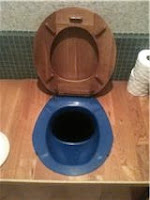06 08 11 Waste…Not
“Waste not, want not” is an old saying worth remembering. In our bioshelter home we try to live by a more modern version of that saying: Waste… Not! We operate out of an understanding that, in the end, there really can be no waste at all.[1] I alluded to that in a previous blog when I described composting as a dirt-to plants-to dinner plate-to toilet-to worms-to dirt cycle. Every bit of waste is a resource for something else, and joining-in on the re-cycle process is a must for good human life.
In our bioshelter, though, we have one area of human waste that has not recycled particularly well—our urine. Our method of composting toilets employs worms in the process, and urine is so acidic that it kills worms. To deal with that our toilet seat includes a urine separator that funnels the urine down a hose and out of the house into a miniature drainage field. We just haven’t found a good use for all of our urine.
Two Views of the Urine Separator
Guys:
You have to sit down to pee
at our house
Of course there are traditional uses for urine, and my favorite is fertilizer. Urine is high in nitrogen, and diluted urine (at least a 5:1 mixture with water) can be an excellent fertilizer for some plants. In fact, though I have been told that collecting urine for fertilizer plants is a going business in some parts of Europe, it hasn’t caught on here in Alaska, yet. So, we decided to try it out on some of our own plants.
One of the things we learned was that it is important to get the dilution solution right. We have had great success with some plants, but in at least two very different cases the fertilizing went wrong.
This year we planted a bean plant above a tomato plant in an upside-down tomato planter, and fertilized it with homemade urine fertilizer. We got the dilution wrong and burnt the poor tomato plant. I’m not sure it will recover, though the bean plant above it is thriving.
Last year I fertilized the bok choy cabbage a little too often. The bok choy bolted, and instead of good cabbages, we got five-foot tall stalks with flowers. On the other hand, “waste not...” The stalks soon bloomed bright yellow flowers, which turned out to add a wonderfully spicy side to any salad!
Still, even though we are slowly refining our understanding of the use of urine for fertilizer, we really can’t use all the fertilizer we produce. So far, it still flows out into a pit outside, carrying with it whatever residue is left of prescription drugs and biological byproducts. Pouring our waste into the ground is not where we want to end up. We are still thinking about that one.
One of the hard realities of spiritual life is not having all the answers. In fact a spiritual life is a life devoted to radical honesty. This means that nurturing a rich relationship with God inevitably means running into one’s own ignorance again and again. The trick is to be willing to accept the fact that one doesn’t know the answers and be open to learning, and the expanding awareness that ongoing learning requires.
Jesus was even more pointed in his words. In Luke’s Gospel (Luke 6:20-26) Jesus is quoted as speaking about how blessed people are when they are poor, or hungry, or weeping, or hated or rejected; and he spoke about how sad it was for those who knew themselves to be rich, or fat, or self-satisfied, or successful in people-pleasing. Clearly part of human existence is to be learning how to address the needs of the world, which means being in touch with those needs. When we then try to address those needs, we find that we have a lot to learn. In fact, a person must know that one has much to learn, and be willing to embrace the learning, in order to be a truly spiritual person.
For me, the urine problem is one symbol of this reality. We recognized that humans have to live more relationally we are to thrive on this planet. We therefore moved into our bioshelter home. I don’t believe that the bioshelter should be dumping urine into the soil; it is surely an immediately usable resource somehow. Somehow, we still do not have it all together.
Quite honestly, living in our bioshelter home has put us on a steeper learning curve than any other home we have had. But is there really any other way to live than as avid learners?
[1] This is an idealized goal, not an actualized reality. We still take garbage to the landfill, but we make it as little as possible.






"Pouring our waste into the ground is not where we want to end up."
ReplyDeleteSome people argue that recycling is the answer. The fact of the matter is, when you recycle materials, you still need fossil fuels to transform it. It's best to not buy anything that you can't reuse yourself on your own property, so that you don't dump it in someone else's back yard. (Thank you Anchorage for all the trash you send us--- NOT)
So, when you buy something packaged at the store, figure out how you will reuse your packaging AT LEAST three times before you send it to the recycling place. My rule of thumb (that I can't always live by): Don't buy it if you can't feed the packaging to the worms. :-)
I had to add my 2 cents.